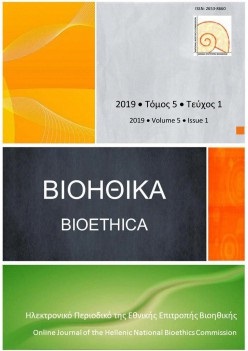The question of the prohibition of prostitution in Europe: A comparative overview of the Nordic and the German- Dutch model and the inconsistencies of the Greek Legislation

Abstract
This article attempts to analyze and compare the two most influential systems that regulate prostitution in Europe: the Nordic model that is based on the total prohibition of prostitution and on the penalization of the purchase of sexual services and the German-Dutch model that introduces the normalization of prostitution via the legalization of the activity in question and the imposition of State controls and regulations.
Furthermore, the article will focus on the policy of the European Union as well as on the Greek legislation regarding the confrontation of the phenomenon of prostitution. As far as the latter is concerned, the inconsistencies of the current legal framework and its applicability problems will be highlighted and the first efforts aiming at an alternative regulation of prostitution will be described.
Article Details
- How to Cite
-
Πολυχρονίου (Ariadni Polichroniou) Α. (2019). The question of the prohibition of prostitution in Europe: A comparative overview of the Nordic and the German- Dutch model and the inconsistencies of the Greek Legislation. Bioethica, 5(1), 67–87. https://doi.org/10.12681/bioeth.20836
- Section
- Original Articles

This work is licensed under a Creative Commons Attribution 4.0 International License.
Authors who publish with this journal agree to the following terms:
- Authors retain copyright and grant the journal right of first publication with the work simultaneously licensed under a Creative Commons Attribution CC BY 4.0 License, which allows for immediate free access to the work and permits any user to read, download, copy, distribute, print, search, or link to the full texts of articles, crawl them for indexing, pass them as data to software, or use them for any other lawful purpose. Appropriate credit must be given by citing the author(s) and the original publication in this journal.
- Authors are able to enter into separate, additional contractual arrangements for the non-exclusive distribution of the journal's published version of the work (e.g. post it to an institutional repository or publish it in a book), with an acknowledgement of its initial publication in this journal.
We encourage authors to deposit their articles, as well as data underlying the publications, in institutional and/or other appropriate subject repositories.
Bioethica permits and encourages authors to archive the final publication pdf in institutional (e.g. the repository of the National Hellenic Research Foundation) or other appropriate subject repositories (e.g. SSOAR repository for social sciences), in compliance with institutional and/or funder open access policies, after publication in the BIOETHICA. Authors must provide bibliographic details that credit publication in the journal, as well as related funding details (when applicable).
Lists of institutional and other subject-based academic open access repositories can be found listed by country at the registry http://opendoar.org/countrylist.php
If your institution does not possess a repository you may deposit a copy of your paper at no cost with www.zenodo.org , the repository supported for open access research in the EU by the European Commission, through the project OpenAIRE (www.openaire.eu )


